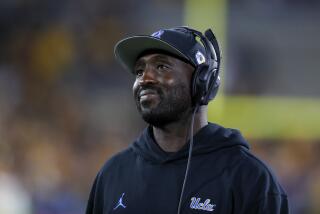Coker Is One of the Guys at Miami, but He Has a Chance to Win National Title as a Rookie
- Share via
The chant didn’t make much sense, but the rhythm was so intoxicating, so hypnotic, it made a 53-year-old football coach do things that would have had the whole town atwitter back home in Okemah, Okla.
“Get off the chain! Get off the chain! Get off the chain!”
They got even louder, those University of Miami defensive linemen, stamping and clapping to the beat. The chant was an everyday ritual--form a circle, call one player into the middle to dance--but this time there was a twist. Now, the wild man in the middle was first-year Coach Larry Coker. Unchained.
“I don’t want to be disrespectful,” defensive tackle Matt Walters said, “but Coach Coker was shaking his booty.”
My, how times have changed at Miami, which is one victory away from its first national championship since 1991. The coaches who preceded Coker--Howard Schnellenberger, Jimmy Johnson, Dennis Erickson and Butch Davis--would have sooner streaked across campus than done a Denny Terio to the beat of some makeshift Miami sound machine.
But this coach is different.
“Coach Coker is like us,” safety Edward Reed said. “He likes being around us. He’s always in the locker room, always in the weight room clowning with us. He’s like one of the brothers.”
That’s one of the reasons Miami players threw their support behind Coker last February, when Davis did a flip-flop, moving on to the Cleveland Browns after telling school officials he wasn’t going anywhere. The players wanted someone they could trust, and Coker, the easygoing offensive coordinator, was their man. Hurricane officials, who had not promoted an assistant to head coach in 25 years, approached Barry Alvarez of Wisconsin and Dave Wannstedt of the Miami Dolphins before turning to Coker.
Chances are, Coker would still be a coordinator if Greg Sciano had played his cards a little differently. Sciano, the defensive coordinator under Davis, badly wanted to be a Division I-A head coach. Davis told him to sit tight and a) take over as coach of the Hurricanes if and when Davis became coach in Cleveland, or b) oversee the defense for the Browns. Instead, Sciano jumped at the Rutgers job, among the worst in college football. The Scarlet Knights finished 2-9 this season and were shut out by Virginia Tech, 50-0; Pittsburgh, 42-0, and--in a cruel twist--Miami, 61-0.
Coker had almost no margin for error in taking over the Hurricanes, who went 10-1 last season before beating Florida in the Sugar Bowl. His challenge: Make a good team great. That was no simple task, considering the school lost its most prolific receivers--first-round NFL picks Reggie Wayne and Santana Moss--and its most dominating defender, Butkus Award-winning linebacker Dan Morgan. The cupboard wasn’t bare, though. Six starters returned on offense, among them quarterback Ken Dorsey, as did eight starters on defense. The kicker and punter came back too.
Still, any letdown would open the door for critics to question the hiring of Coker, who now could become the first coach since 1942 to win a national title in his rookie season.
“I’m not saying what Coach Davis did was easy,” tackle Joaquin Gonzalez said. “But it was a lot easier to take a team from 5-6 to 9-3 to 10-1, than to go from 10-1 to 11-0.
“A lot of people said a lot of people could have done this job. Coach Coker said even a monkey could coach this team. But I think he’s being really humble, way too humble. Because to get a team like us with so much talent, and to keep us going, week in and week out, to not let us let up one single weekend, that’s a hard job.”
Coker’s coaching style is as friendly as his soft drawl. As he walked off the practice field last week, he passed a line of players soaking in barrels of ice water. They began to chant his name. To their delight, he stopped, dropped what he was carrying and lowered himself waist-deep into the frigid water--shoes, shorts and all.
Some of the players have young children, and it’s not uncommon for Coker to pull a little baby-sitting duty while their fathers go through an early-morning workout.
“I’ll entertain them a little bit,” Coker said with a sheepish grin. “I have so much respect for a person to make that type of sacrifice, to come, get up early, work out and still bring their kids with them. That kind of impresses me. That says a lot about this team.”
Compare that to the iron-jawed Davis, who once charged into the locker room during halftime of a game against Rutgers, incensed his team was leading only 13-3, and shattered a blackboard with his fist.
Miami players liked both coaches. It’s just that they can exhale around Coker.
“Coach Coker and Coach Davis both had an open-door policy,” Walters said. “But the thing about Coach Coker is, you go into his office, and you’re not going to find him in his office. He’s going to be down somewhere, interacting with the players. He’s going to be down in the weight room, down in the locker room.”
Coker’s style reflects his modest beginnings. He got his previous experience as a head coach at two Oklahoma high schools. After that, he worked as an assistant at Tulsa (1979-82), Oklahoma State (1983-89), Oklahoma (1990-92), Ohio State (1993-94) and Miami (1995-2000). He coached Barry Sanders, Eddie George and Edgerrin James. Last season, the Hurricanes scored a school-record 469 points--a mark they eclipsed this season with 475, an average of 43 a game.
After routing Washington, 65-7, Coker was accused of running up the score, a tradition established by the brash Hurricane coaches who came before him.
He bristled at that, pointing out that he’d used second-and third-string players in the second half, didn’t throw much, and adding wryly, “Certainly, it’s the other team’s responsibility to hold the score down as well.”
Coker’s most endearing trait is his ability to laugh at himself. He made his head-coaching debut against Penn State, when Joe Paterno was one win away from tying Bear Bryant’s Division I record of 323 victories.
Actually, it was the second time Paterno and Coker had crossed paths.
“I was an assistant at Oklahoma State, going to my first [coaches’] convention, and it happened to be in Miami,” Coker said. “My friend and I were driving around town. We were just like tourists, we were looking around. All of a sudden, my friend slams on the brakes and I look up, and Joe Paterno was walking across the street. I said, ‘My God! You almost killed Joe Paterno!’ I don’t think [Paterno] was ever really in danger, but it got my attention.
“The white socks definitely got my attention.”
Coker didn’t crush Paterno then, but his Hurricanes wound up crushing Penn State this fall, 33-7. Six games into the season, Paterno tied the record. A week later, against Ohio State, he broke it.
Fear not, Miami faithful. Coker is not only a humble man, but a patient one.
“Gosh,” he deadpanned, “I’m chasing those records too. I just got a later start.”
(BEGIN TEXT OF INFOBOX / INFOGRAPHIC)
COKER FILE
Born: June 23, 1948 at Okemah, Okla.
Seasons at Miami: Seven, one as head coach (11-0 record). Previously served as Miami’s offensive coordinator and quarterback coach from 1995. Miami had three of its four 1,000-yard rushers (Danyell Ferguson, Edgerrin James and James Jackson) and six All-American offensive players in that time.
Previous coaching experience: High school--Fairfax (Okla.), 1970-76 (77-17-3 record); Claremore (Okla)., 1977-78 (16-7). College--Tulsa as quarterbacks-running backs coach, 1979, and offensive coordinator, 1980-82; Oklahoma State as offensive coordinator, 1983-89; Oklahoma as offensive coordinator, 1990-92; Ohio State as defensive backs coach, 1993-94, and offensive coordinator, 1995. Among the prominent players he coached in those years were Barry Sanders, Thurman Thomas and Hart Lee Dykes (Oklahoma State), Cale Gundy (Oklahoma), and Eddie George, Orlando Pace and Shawn Springs (Ohio State).
Playing experience: Defensive back at Northeastern (Okla.) State from 1966 to ’69. He was a three-year letterman.
More to Read
Go beyond the scoreboard
Get the latest on L.A.'s teams in the daily Sports Report newsletter.
You may occasionally receive promotional content from the Los Angeles Times.











